
Cryptocurrencies are one of the most unpredictable and thus exciting pieces of the market. Navigating through the rough waters of cryptocurrencies requires knowledge and willingness to take some serious risks. The risks associated with investing in cryptocurrencies were the object of interest of numerous governments right from the start of Bitcoin back in 2009, but the market has been growing nonetheless.
Despite being one of the fastest-growing markets, cryptocurrencies are difficult to market for several reasons – one of them being government interference. One of the most recent examples is the action taken by the Indian government at the beginning of 2022. The Advertising Standards Council Of India worked up the solution – starting April 2022, any advertisement regarding the crypto market should convey the disclaimer: Crypto products and [non-fungible tokens] are unregulated and can be highly risky. There may be no regulatory recourse for any loss from such transactions. Such a decision made it even more difficult for crypto businesses to market their solutions effectively, but – truth be told – it needed to be done as a small but necessary step to a more aware and safe crypto market.
As I mentioned earlier, investing in cryptocurrencies requires exceptional knowledge. Unfortunately, in many cases that was the primary issue – people were approaching crypto without preparations which eventually led to them losing money. That’s where the government stepped in to save them some disappointment in the future.
It’s not like governments are the worst things that happened to the cryptocurrency industry. The real problems are fraud, misleading ads, and the excessive optimism of beginner investors. The easiest way to market cryptocurrencies is by promising lots of money for almost no effort, but it’s a dead-end (not to mention it’s immoral). So the real question is: how do I market my crypto currency business ethically and effectively?
To prepare for this article, I’ve browsed dozens of crypto business websites, Twitter feeds, LinkedIn profiles, Reddit threads, and so on. All this is to find out how crypto companies deal with their marketing and what they focus on. My findings aren’t astonishing – the main goal of most marketing campaigns I stumbled upon is – surprise, surprise – customer acquisition. And how do crypto companies try to acquire as many customers as possible, you might ask? The answer’s right below!
After researching over 20 crypto companies, I have selected 4 marketing strategies that repeatedly appeared – most of the businesses I’ve checked decided to run at least one campaign of such a type in the last couple of months. These are:
But it’s not the only type of marketing strategy that matters. There are tons of events and occasions that drive crypto businesses to launch their sales promotions. I’ve taken a closer look at the list from this angle, and there they are:
Of course, there are far more opportunities like these, but those seem particularly important (and often used) in the crypto market. Let’s get to the list and see which promotional strategies are worth trying out if you’re planning your crypto business marketing right now.
Online giveaways, contests or sweepstakes – all those names describe one marketing technique in which a company organizes contests with valuable prizes. Usually, such events are targeted either at new or existing customers. That’s because online giveaways work best in two situations:
Running online contests can be a part of a larger marketing strategy called gamification, but they work well even if they are paired with something else – here are some examples:
Giving away 1,00,000 (1 lakh) of SHIB coins for a sweepstake winner doesn’t seem like a super exciting deal considering the value of this currency. At this point, 1 SHIB coin is worth 0.000011 USD – make sure to count all the zeroes), so the value of the giveaway oscillates around… 1,1 dollar. But! We’re talking about cryptocurrencies, so there’s always a chance (even if tiny) for this one to become another Bitcoin (or Ethereum, at least). And even if it won’t, in a crypto world, many people know how to trade currencies, so I think they’d know how to put those 1,00,000 SHIB to good use.
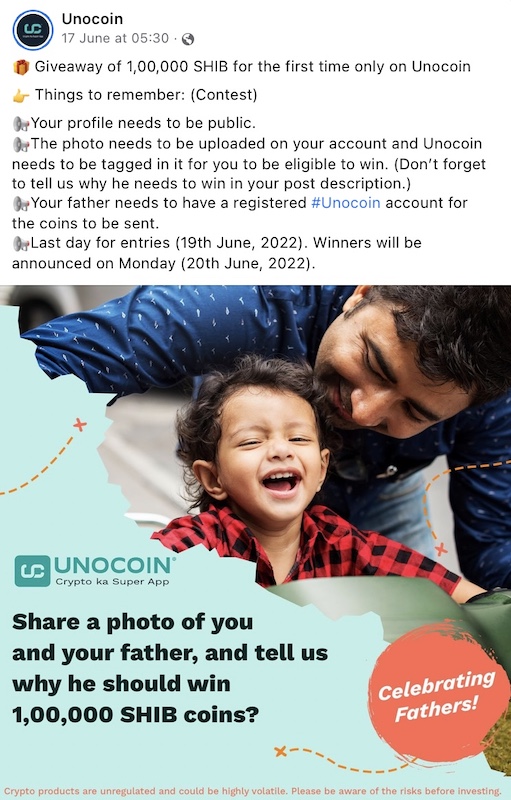
Letting people know about new partnerships is vital to most marketing agreements. Two companies joining forces are usually eager to mark the beginning of their cooperation with an event held together. An online giveaway can be a perfect way to kick off the partnership.
Metamouse – a company that gives its customers an opportunity to pay their bills with crypto – partnered up with DappBackHQ so they could create their task journeys – it’s a specific type of giveaway in which participants need to perform a series of tasks. Each task is rewarded with points, and users can trade points for a prize after reaching a certain threshold.
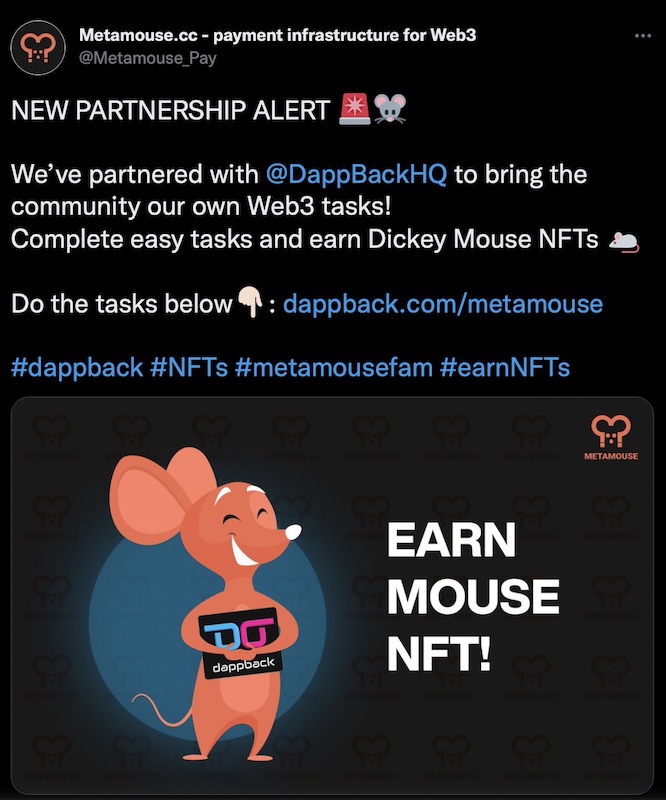
In this case, Metamouse offers their Dickey Mouse NFT token as a reward for completing tasks worth 120 points. The best thing about such a type of giveaway is that companies may create their own tasks – typical ones, like “Visit our website” or “Follow us on Facebook” but also more complex, such as filling out one-question surveys and so on. Also, they can “block” some of the tasks until the participants reach a certain amount of points.
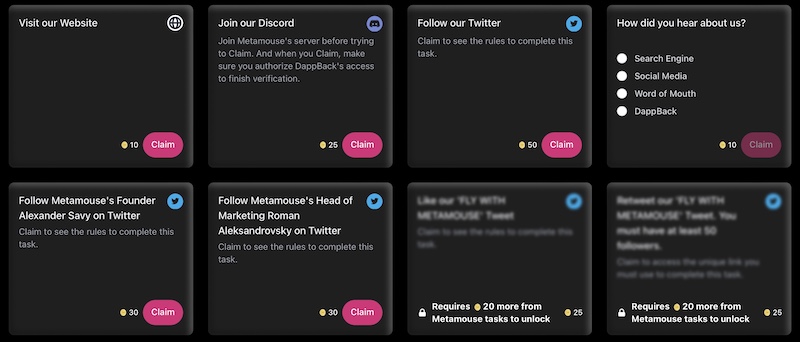
Upon launching their new mobile app, Pintu decided to run an online giveaway in which they asked people to review their app. Participants needed to post the review on YouTube for a chance to win valuable prizes such as a Sony PlayStation 5 console, iPad, Air pod headphones or – of course – crypto.
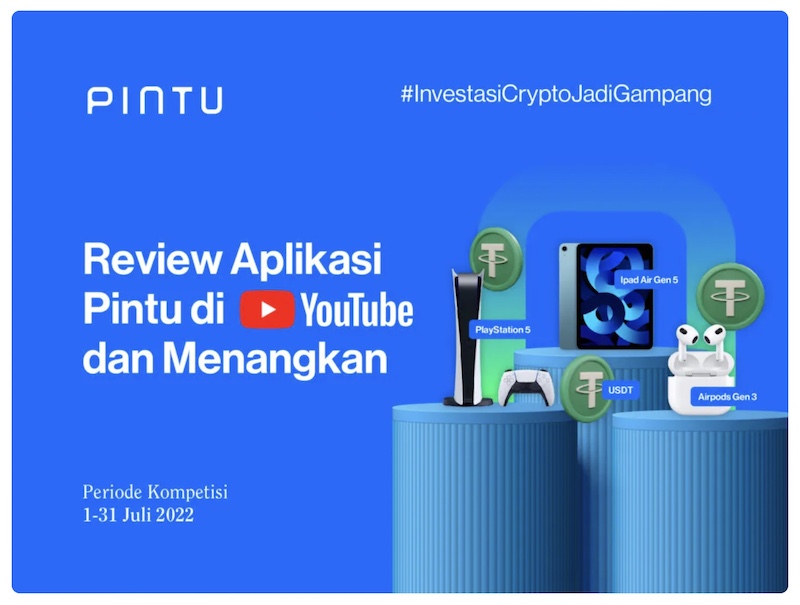
Bitoasis is headquartered in Dubai, United Arab Emirates, where Eid (the ending of Ramadan) is an important day in the calendar. It is also an opportunity for many brands to spread the word about them and organize simple contests, such as this one:
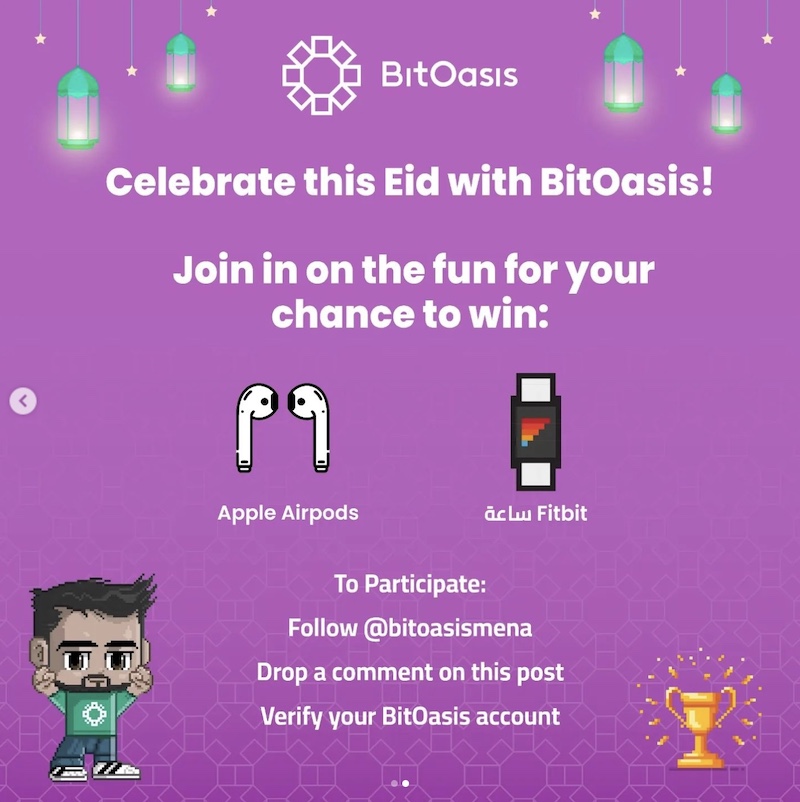
As you can see, the rules in the BitOasis contest are simple, which may convince many people to join the giveaway. Also, the rewards are valuable and concrete – many people prefer a solid pair of Apple AirPods over a handful of crypto, and I’ll be the last to judge them!
There are dozens of promotional strategies out there. Some become very popular just to get lost somewhere in the process, but discount coupons are here to stay. It’s almost always a good idea to give customers (or potential customers) an opportunity to buy your products or services with a slight discount, especially if you’ve got a plan on what to do next.
It’s a basic type of promotion you can observe almost anywhere, but there is a reason companies stick to this idea. The one-time discount for newsletter signup is a really low price for enabling an opportunity to communicate with a potential customer for a very long time.
Of course, there’s no point in launching such a promotion if you don’t have your email marketing thought out (or if you don’t run a newsletter at all). But if you do, ensure you’re doing everything possible to get as many people as it gets on the list!
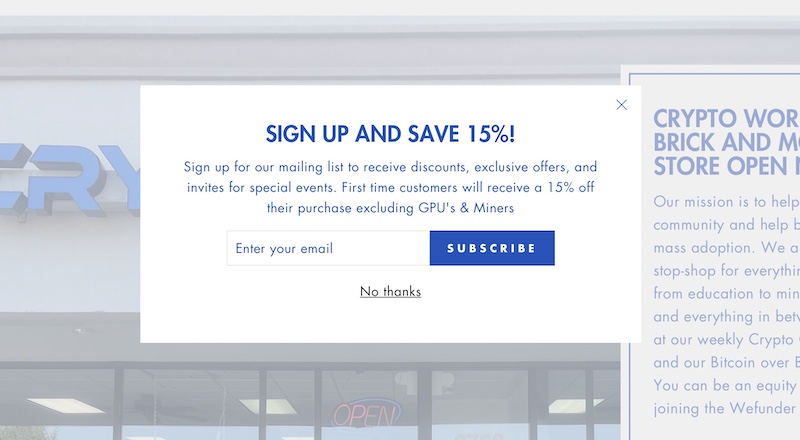
It’s the second example of Unocoin’s promotions, and already a second one celebrating Father’s Day! Interestingly, both promotions have been launched at pretty much the same time, but the second is targeted only at new customers – the discount is assigned after successful signup.
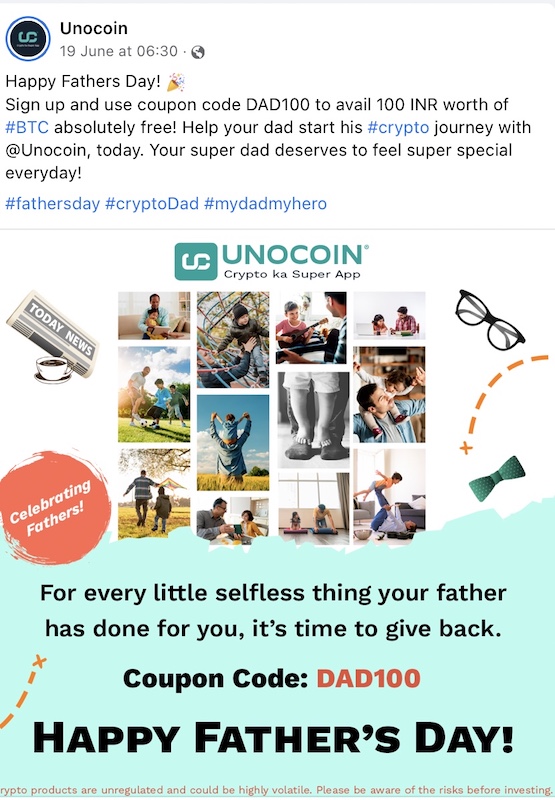
With proper coupon software, creating such a discount coupon is simple enough so the crypto companies can come up with campaigns like these each time there’s something to celebrate. So even if the first promotion won’t end up bringing hundreds of new customers, the next can be groundbreaking.
A promotion tied with a newly-formed alliance is not a novelty (even in this article), but it’s just another example of greatly-prepared advertising. Pintu partnered up with Grab, and together they issued a GRABPINTU promo code, available for all Pintu users who’d decide to create an account in Grab. The discount code gives new Grab customers a significant discount (up to 90%!) for the company’s flagship services: GrabFood, GrabBike, and Grabcar.
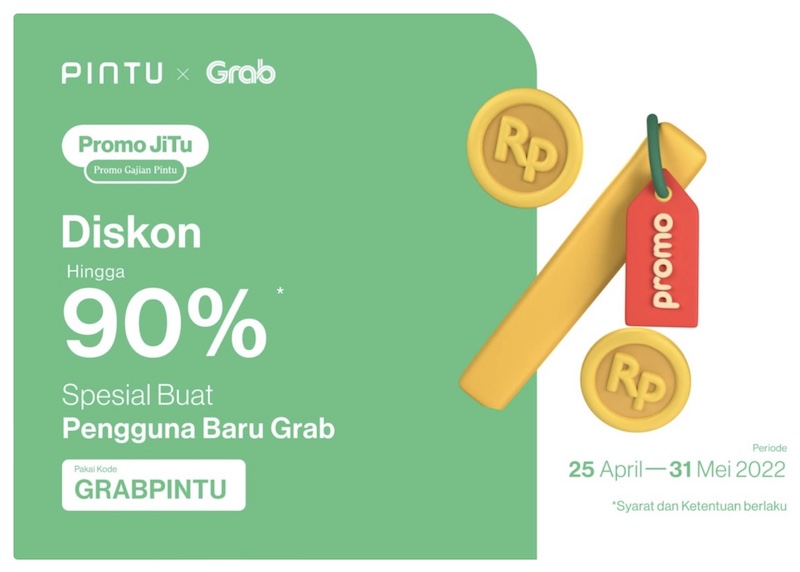
It is not a secret that all the companies want their customers to buy as much of their products or services as possible. But how do I convince people to spend their hard-earned money? One of the ways to do so is by offering a cashback loyalty program. In short: it gives a chunk of money paid back to the customers.
Since BitOasis is used for trading cryptocurrencies, it offers 0.5% of cashback to all the customers who decided to swap one of their currencies to another. Of course, not for all the operations, but for the first three. Nevertheless, it’s a great deal, especially for those who trade big numbers.

If a company decides to run a referral program, there’s usually a single goal: acquiring more customers. More dedicated and loyal customers, to be precise. Customer acquisition is a bottomless pit. Businesses try hundreds of options, run thousands of campaigns and read millions of pieces of advice to do it right, but the data doesn’t lie. If you want to acquire valuable customers who’d stick with your brand for a long time, create a referral program. A few crypto companies have already done that and it looks like it works for them! Let’s take a look at a few examples.

In this scenario, BitOasis rewarded each referral program participant who gets their friends to sign up. In addition, every trade made by the referee adds credits to both the referrer and referee, so it’s a classic win-win situation.
A simple referral program is often worth more than complicated, multi-tiered programs that require a lot of engagement and lots of time to actually earn something. CoinDCX follows its claim (making crypto accessible to everyone in India) and has created a streamlined referral system – participants need to invite two friends, and they’ll get Ethereum coins worth ₹600. Though ₹600 is worth only $7.5 (as of July 2022), the ETH cryptocurrency is one of the market's most profitable and stable cryptos. CoinDCX’s referral program should be exciting for those who focus on trading or holding crypto.

Not every customer referral program is as convincing as its creator would like. That’s why it should be well-promoted. And there’s just a way to make a referral program instantly more appealing: a contest.
CoinDCX threw a referral contest at the end of 2021 with a fantastic prize to get – crypto worth ₹3,00,000 for the winner (it’s about 3,700 USD). The competition had a few tiers with guaranteed rewards for referring a certain number of customers:
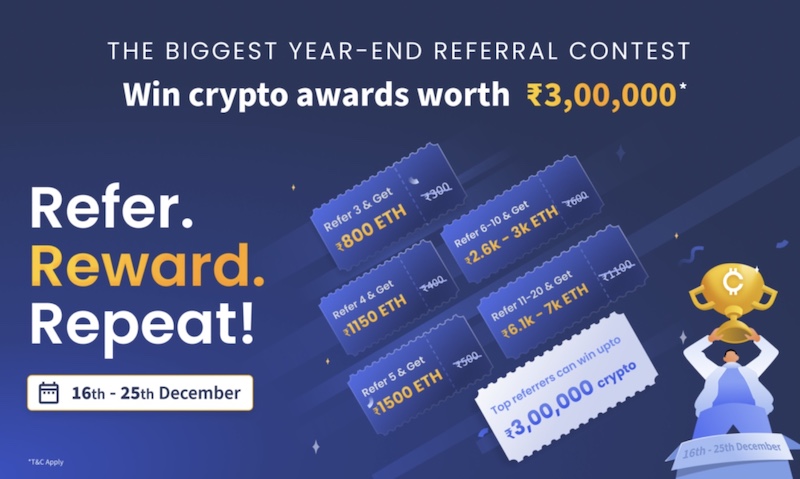
The list for crypto marketing techniques does not end on those four examples – apart from giveaways, discounts, referral programs and cashback programs, there are thousands of strategies you can incorporate to acquire more customers, engage the existing ones or stimulate them to spend more. Here are three more examples that could be helpful in your crypto business:
Creating an account doesn’t guarantee that the user will stick with your brand longer. Sometimes people sign up only to see what will happen and leave, never to come back. Try to catch their attention from the very beginning with a simple bonus – a thank-you gift for new customers.

In this case BitOasis decided to welcome their new users with a symbolic 75 AED credit. Not much, but enough to start their journey with crypto and engage users from step one.
Trying to start your business in an established market is always a challenge. New ideas usually need a severe boost to become recognizable and reach their target audience. So Metamouse decided to pay 10 dollars to each person who’d be nice enough to review their app via ProductHunt or leave their feedback in any other way. There were two goals of this offer: showing the app to people interested in crypto as well as getting valuable feedback to improve the application even further.
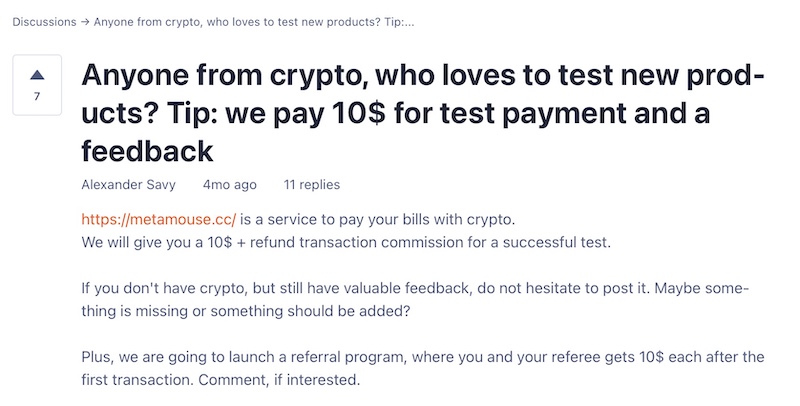
Promoting crypto businesses successfully and ethically is complicated – no doubt about that. Some people are fairly careful about crypto – those need to be convinced. Other people, though, are willing to dive into the crypto world head first – those need to be educated. Keep that in mind while planning your next marketing steps.
I hope the list above gave you a few ideas on what to do next and how to market your crypto business. Make sure, though, that you have a clear purpose, then a capable promotion engine, and a general vision of what you’re eager to offer in exchange for new customers, increased engagement, or whatever your goal is.
.svg)